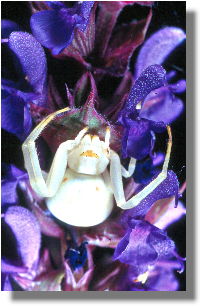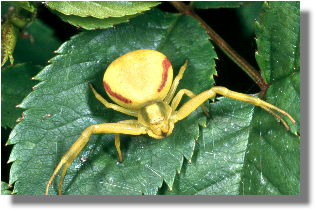 |
"A beautiful death" ...is a contradiction - and a saying that we sometimes use to describe the physical end of a living creature, when its end doesn't make it suffer or doesn't cause a lot of stress. By this story, we introduce a different kind of "beautiful death": a crab spider called Misumena vatia. It is a beautiful spider often found in a romantic environment: it usually sits in flowers. This is its place to wait for insects that visit for the nectar and pollen of the flower. The spider acts as a mortal surprise: as soon as the victim approaches near enough, the spider thrusts its fangs into the insect and injects its poison. The fangs are a part of the chelicera, that can be recognized in the pictures as the two sturdy protrudings underneath the spider's head, in-between the two slim palps. Misumena vatia can be of white, yellow or greenish color. Often, it shows two red stripes on the sides of its abdomen. In its waiting position, it often spreads its "arms" wide open. |
